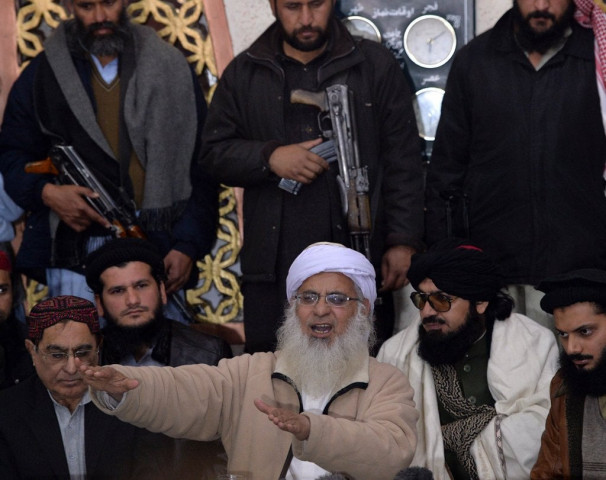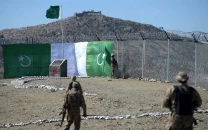Peace initiative: Maulana Aziz strikes a discordant note
TTP intermediary wants Sharia on agenda; colleagues hope to win him back.

“I’ll remain part of this [Taliban intermediary] committee — but, yes, I will not sit for future talks until my demands are met,” says Maulana Abdul Aziz. PHOTO: AFP
One of the Taliban intermediaries, Maulana Abdul Aziz, has refused to attend future meetings with government negotiators until the implementation of Sharia law is on the agenda.
“I’ll remain part of this [Taliban intermediary] committee — but, yes, I will not sit for future talks until my demands are met,” Aziz told journalists in Islamabad on Friday after a meeting of his Shura in Lal Masjid.
“Peace talks may be delayed because the government wants the talks within the limits of the Constitution but the Taliban believe only in the Holy Quran and Sunnah,” he added.
The government’s four-member negotiating committee met with the TTP intermediaries on Thursday, where the first demand of the former was that the talks would be held within the purview of the Constitution.
“Our first demand to the Taliban is submission to the Constitution of Pakistan,” Irfan Siddiqui, the coordinator of the government committee, had said after the three-hour session.
But Maulana Aziz reiterated that the people the government is trying to have a dialogue with do not believe in the Constitution. “I will not take back my demand for the enforcement of Sharia law. If Maulana Samiul Haq and the Taliban want to kick me out of the committee, they can.”
Irfan Siddiqui rejected the idea of implementing Sharia, saying that it cannot happen even in the tribal areas, which has made these talks useless, he said.
But Maulana Yousaf and Prof. Muhammad Ibrahim claimed they would convince Maulana Aziz to attend future meetings. “We will keep Maulana Aziz with us at all costs,” Prof. Ibrahim told The Express Tribune.
Echoing Maulana Aziz’s views, TTP central spokesman Shahidullah Shahid said the Taliban wouldn’t be waging a war against the government if they followed a law or a Constitution other than Islamic Sharia.
Talking to the BBC on Friday, he said the real purpose behind holding dialogue with Pakistani government was to enforce Islamic Sharia in the country.
“The war we are fighting is for enforcement of the Sharia […] and we will be holding talks with the government for the same objective,” he said. Asked how Sharia can be enforced when there is also a constitution in place, he replied: “This is simple because the party we are holding peace talks with claim they are Muslim and Pakistan was created in Islam’s name [...] so this task shouldn’t be difficult for any Muslim.”
He said that a meeting with the Taliban intermediaries was due in next four to five days in which future course of action would be directed to them.
The Taliban intermediaries have agreed to recommend a ceasefire to the nine-member Political Shura of the Tehreek-e-Taliban Pakistan (TTP) overseeing the peace talks with the government.
“We [both the committees] have unanimously agreed upon a ceasefire. The Taliban committee will convey the government’s proposal of a truce to the TTP’s top Shura,” JUI-S spokesperson Maulana Yousaf told The Express Tribune.
“The Taliban committee agreed with this proposal as we all believe that there should be no activity by either side that can potentially harm peace efforts,” Rahimullah Yousafzai, a member of the government committee, told The Express Tribune. “Only with a ceasefire can these talks yield a lasting peace agreement.”
They also suggested to the Taliban intermediaries to ask the TTP leadership to include a couple of members from their Political Shura for more productive results.
Doubting the success of talks
Pakistan Tehreek-e-Insaf (PTI) chief in an interview to Bloomberg predicted that negotiations will start, but then there will be about three to four big explosions and the negotiations will be called off.
“We hope dialogue succeeds but the way it’s being set up is not the way we think it should be done. It has to be transparent and open.” Khan also disagreed with the TTP’s interpretation of Sharia law.
Published in The Express Tribune, February 8th, 2014.



















COMMENTS
Comments are moderated and generally will be posted if they are on-topic and not abusive.
For more information, please see our Comments FAQ